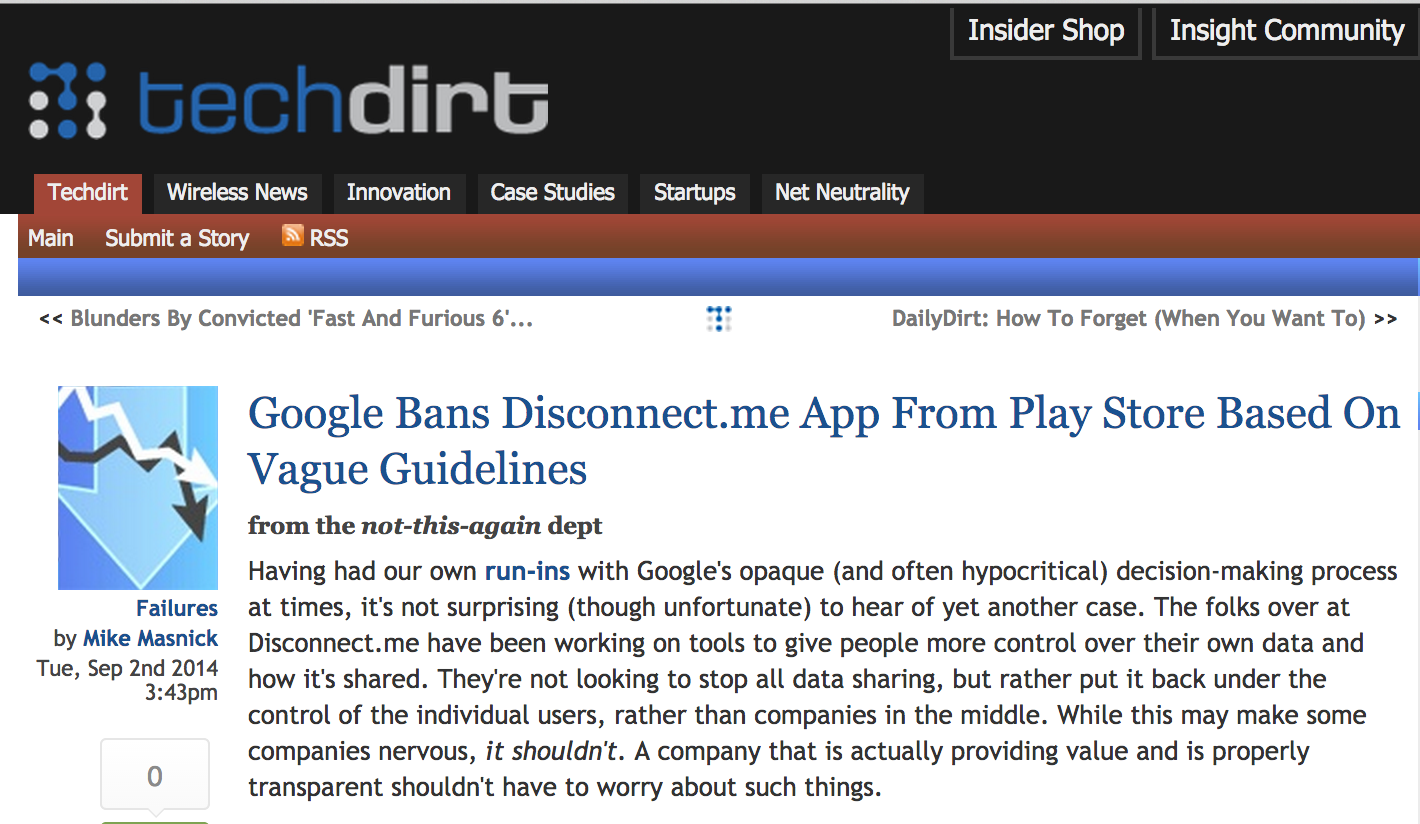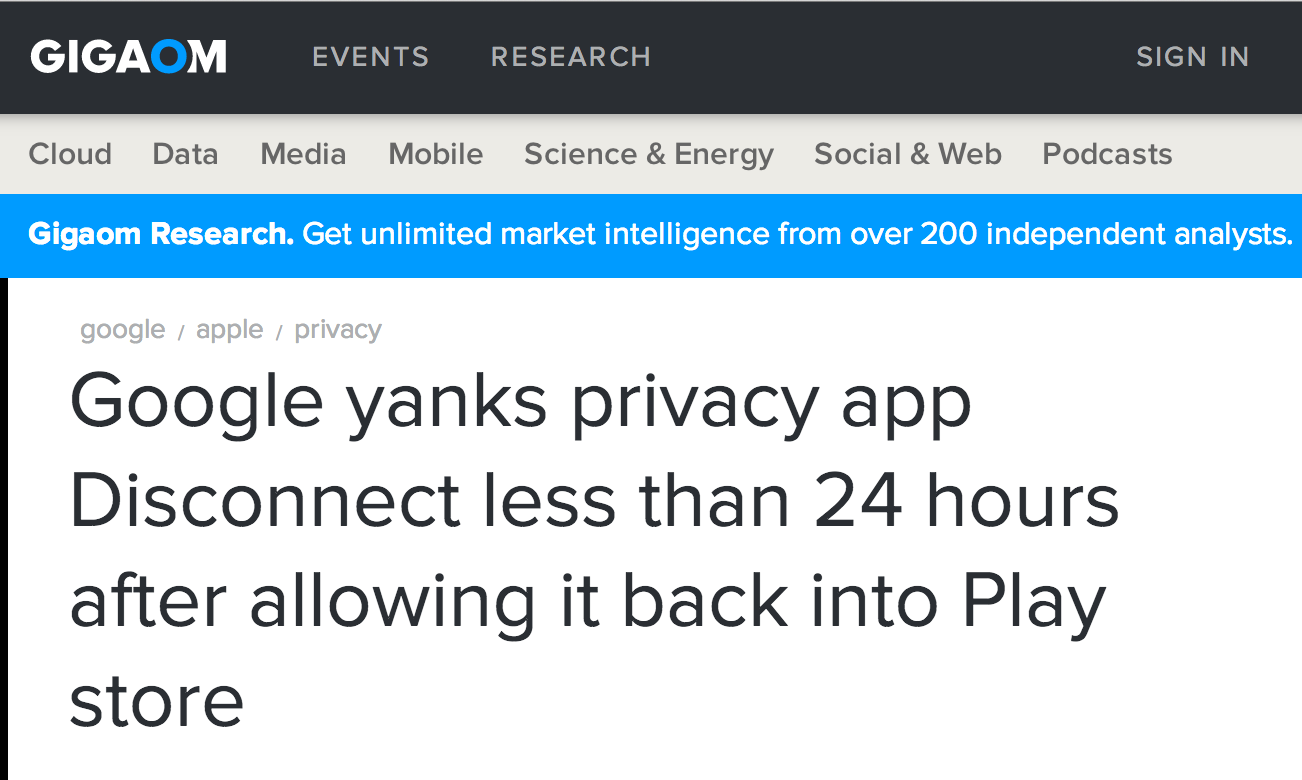Update: Our app still banned from Play and Google won’t talk about it
Why this decision is bad for the Internet and what we can do
Posted on October 28, 2014Seven weeks ago our Android app, which blocks malicious tracking and malware, was banned for the second time by Google. Our appeals to date have been denied and Google refuses to explain their decision, other than to say that our app won’t be allowed if it interferes with any ads; even ads that contain malware and steal your identity.
Obviously Google’s ban wasn’t great news for us, but we’ve been amazed by the support from our community: over 100,000 people installed our products in the first 48 hours after the ban and we’re now averaging about 100,000 installs per week. Also, the ban inspired a bunch of great press coverage, which highlights larger concerns about Google’s growing power.
Google is in such a dominant market position on mobile, that their decision to ban legitimate apps from Android amounts to Internet censorship. Over 84% of total smartphones shipped in Q2 2014 run Android and the Play Store accounts for most consumer Android app discovery and distribution. While our banned app is available for download via our website and others have uploaded our app to alternative app stores, Google has intentionally made distributing and monetizing apps outside the Play Store overly difficult, which is the subject of an active anti-trust investigation in the European Union.
With so much control over consumer Android app distribution, Google has a responsibility to police the Play Store on behalf of users. But the choices Google makes about what apps are banned and allowed appear in many cases to be dangerously anti-user.
For example, malware infected Android apps in Play have nearly quadrupled in the past few years. At the same time many popular privacy apps including ours have been removed. In our case, Google justified the removal because we interfere with some ads. Yet they allow dozens of apps in the Play Store whose stated purpose is to block ads, but are either not effective, have low ratings, or require users to root their devices. Meanwhile, our app does what it claims to do (protects users from malware and malicious tracking that are sometimes distributed through ads) and was rated 4.2 stars by 162 reviewers prior to being banned.
It’s not surprising that Google’s concerned about popular and effective apps that interfere with their ad revenue, which accounts for pretty much all of the estimated $66 billion they’ll generate this year. Even a small dip in the price of their ad units significantly threatens Google’s bottom line. But to protect their profits, Google is denying Android users the ability to control their own devices and to protect themselves. This is especially dangerous considering that malware was spread through billions of ads last year and that malvertising attacks grew by 200% in 2013.
Ironically, at the same exact time that Google was kicking our app out of Play, Google’s own advertising network was hacked (again) and used by criminals to distribute malware to millions of users—an attack our app protects against. In fact, Google’s ad network has been used to distribute malware on many occasions, which is why in May the U.S. Senate warned Google to clean up their ad network or face legislation that would make Google liable for the hundreds of thousands of identity theft incidents that result from malvertising each year.
Unfortunately, Google’s response to this warning seems to be: not only will we not clean up our act, but we won’t allow apps in Play that provide a meaningful solution to the growing threat of malvertising. This position is unacceptable and will hopefully inspire regulators in the U.S. and elsewhere to get involved and protect consumers from Google.
In the meantime, we’ve been asking ourselves what we can do to get Google to re-commit to their mission of doing no evil. We’ve got a few ideas, but before moving forward we’d love to hear what you think. Please take this one question survey to let us know your thoughts on the best way to draw attention to Google’s actions.
Thanks for your support!
Posted by Casey Oppenheim




